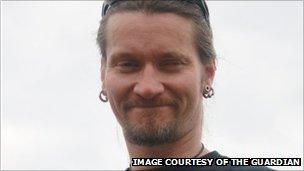The women betrayed by undercover officers
- Published

PC Mark Kennedy alias "Flash" Stone had a sexual relationship with 'Lisa'
The stories of women who were unknowingly involved in relationships with undercover police officers are revealed as their testimonies to MPs are made public., external
Following the revelations of inappropriate relationships, the home affairs select committee has called for an urgent review of laws governing undercover policing.
Here are the women's accounts of how they felt when it emerged that their relationships, which lasted from two to six years, were based on deception. These are not their real names.
'Lisa'
"I was absolutely shocked and devastated," she told MPs.
Lisa had a six-year relationship with former PC Mark Kennedy, who posed as long-haired dropout Mark "Flash" Stone to infiltrate a group of environmental protesters.
"You imagine that somebody may be in public meetings that environmental groups have. You imagine there might be somebody listening in there. You could even imagine that your phone might be tapped or that somebody might look at your emails.
"But to know that there was somebody in your bed for six years, that somebody was involved in your family life to such a degree, that was an absolute shock.
"Well, 'shock' is an understatement. It felt like the ground had shifted beneath me and my sense of what was reality and what wasn't was completely turned on its head."
During the hearing she was asked whether she had any sympathy for Mr Kennedy, who is suing the Metropolitan Police claiming he had been traumatised by what had happened.
"As a human being it is very difficult not to have sympathy for somebody that I cared about deeply, but it is also important to remember that that person that I cared about deeply did not in fact exist," she replied.
She adds that she still has questions about what happened.
"Who was listening in to our most intimate phone calls? Who saw our holiday photos? Was there anybody following us when we were on holiday?
"Who made the decisions about what happened to my life, where I was allowed to go, who I was allowed to see, which I thought was my free will but actually was being manipulated by this person who was being controlled by other people?"
'Alison'
"We weren't married, clearly, but we shared the same flat. He was completely integrated into my life for five years and then one day he disappeared," she said.
Alison had a relationship with a man she knew as Mark Cassidy, who she met through a group she was involved with in 1994. But he was in fact an undercover police officer. She told MPs the revelation had an "enormous impact" on her life.
"The experience has left me with many, many unanswered questions, and one of those that comes back is: how much of the relationship was real?," she told MPs.
"Some of the consequences of that have meant that I have, for the last 13 years, questioned my own judgment and it has impacted seriously on my ability to trust, and that has impacted on my current relationship and other subsequent relationships.
Alison, a peaceful campaigner involved in left-wing political causes, believes she inadvertently provided him with "an excellent cover story", helping persuade other activists he was genuine.
She said he became totally integrated into her family, appearing in her mother's wedding photograph, accompanying her on holidays and supporting her through the bereavement of a close friend.
"This is not about just a lying boyfriend or a boyfriend who has cheated on you. It is not even about a boyfriend who is having another relationship with somebody else. It is about a fictional character who was created by the state and funded by taxpayers' money."
'Clare'
"You do not know who you can trust any more. It destroys everything," she said.
When the boyfriend Clare knew as John Barker disappeared two years into their relationship, she was determined to track him down. She found a death certificate for his name, and discovered he had been using the identity of a child who had died of leukaemia aged eight.
She visited the child's house, but their parents no longer lived there.
"He had told me that his parents were dead when we were in a relationship, so I wasn't expecting to see the parents, but I thought that if I went there... he had been a missing person for however long and I was desperate to find him. I was really concerned about his welfare," she explained.
"Nothing made sense of what had happened, and so I went there desperate, thinking I have to follow every clue that I have, and I thought maybe some other members of the family may still live there or somebody might know where he was."
She said people trying to justify the practice saying things like it prevented terrorism, was very distressing.
"This is not about a need to do it. It is about a desire to do it. They have the power and they think they can get away with it. That is what it is about.
"It is deeply distressing, and I do not think it should be allowed in any circumstances. It is so intrusive into people's lives, and, as my friends have said, it turns your life upside down.
"Everything that you thought you knew suddenly becomes unreal; everything changes," she said.